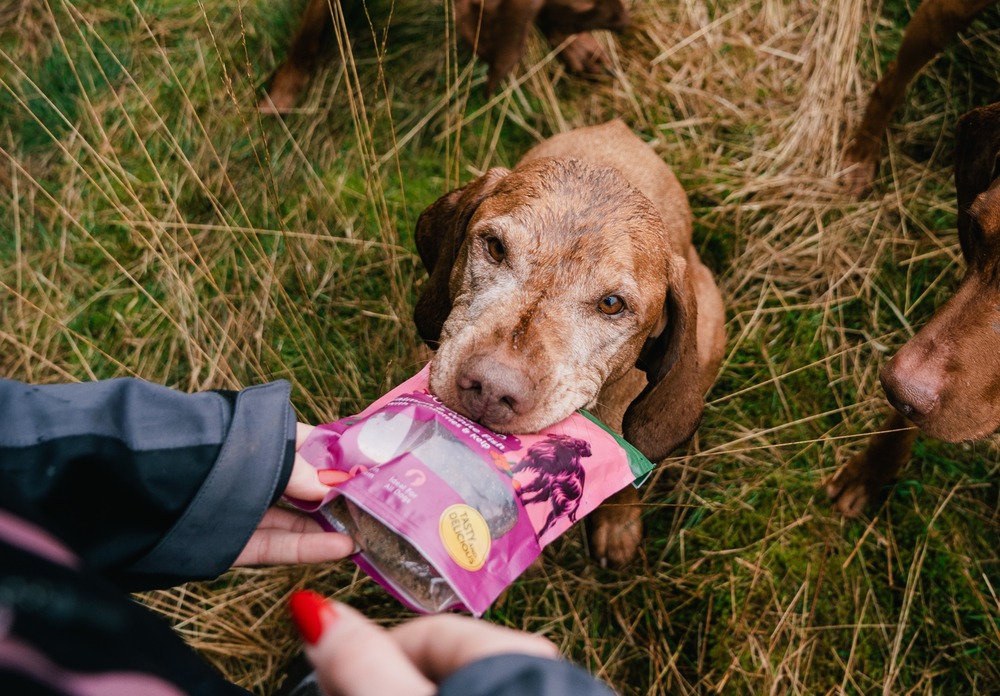Quick takeaways on ageing dogs
- Larger dogs tend to show signs of ageing earlier than small dogs.
- Dogs are classed as ‘seniors’ when they reach the final third of their life expectancy.
- Signs of old age include slowing down, weight gain and reduced appetite.
- Senior dogs tend to have around 20% less energy than their younger selves.
- Choosing a high-quality raw food that’s high in protein and low in fat is one of the best ways to look after your older dog.
If you’ve been lucky enough to watch your dog grow up, you’ll know that things can change a little as they get older.
When dogs age, they tend to slow down a little, they might need a special diet for senior dogs – and they might need a few more vet check-ups to help them stay healthy and happy for longer.
These tips will help you care for your dog as they approach their older years.
What age is a senior dog?
Well, that depends on lots of factors, like your dog’s breed and size. Smaller dogs, for example, may show signs of ageing when they’re around 9-10.
Whereas a large St Bernard may show signs at around 6-7. However, the general rule of thumb is that a dog can be classed as senior once they reach the final third of their expected lifespan.
Age is just a number
Once they reach this stage it can be helpful to think of your older dog as a ‘senior’ – not because they suddenly need wrapping in cotton wool, far from it!
It’s more about being a knowledgeable pet parent who has the confidence to adapt a few things if needed, so you can enjoy your time together long into their senior years.
Even things like keeping your older dog a healthy weight can make a big difference to their overall wellbeing and energy levels by keeping pressure on their joints and organs to a minimum.
What changes happen as dogs get older?
As dogs age, you might notice physical signs like decreased energy levels or joint stiffness, and them moving at a generally slower pace.
Senior dogs often experience changes in weight and appetite, so you might need to adjust their diet.
Signs to look out for:
- Slowing down and becoming less physically active
- Difficulty getting around – for example, stiffness when climbing stairs or reluctance to jump in the car
- Weight gain, even though portions remain the same
- Reduced appetite
- Skin, coat and nail changes like dry skin, brittle nails or a coarser coat
- Increasing grey hairs
Their eyesight and hearing might start to decline. If you notice your dog moving more cautiously or responding less to your sound cues, make sure to speak to your vet as they can help to assess.
So, regular check-ups become more important as your dog ages. Your vet can help to identify subtle signs of ageing, do screenings for common senior health issues, and help you create a care plan to suit your pooch.
Here are 9 simple ways you can care for your older dog and help them live long and happy:
1. Think about their diet
Our beloved dogs are good at hiding things (apart from those greys) so whatever your dog looks like on the outside, it’s important to keep them as healthy as possible on the inside with well-balanced meals packed with nutrition.
Opt for high-quality foods like raw that are rich in protein and low in fat. Foods with fresh fruits and vegetables will add vitamins and antioxidants, which can help dogs live longer – according to recent research.
You might want to consider joint supplements as a food topper but always speak to your vet before adding these in.
Lastly, monitor how much your pet is eating and drinking. It’s worth mentioning any changes in their appetite or weight to your vet, as there could be an underlying medical reason.
2. Keep them comfortable
Older dogs might need more rest. So, make sure they have somewhere quiet to sleep where they won't be disturbed – like a soft, cosy dog bed away from draughts.
They may also need some extra cushions or padding on their bed to help keep stiff joints more comfortable while resting.
Keep things like their water, food, toys and bed easily accessible, so they don’t have to go too far for the essentials.
Also, think about your flooring. It can help older dogs to have something to grip, and smooth, slippery floors can be difficult for them to walk on. If this is the case, pop down a rug or an old piece of carpet to help make them more comfortable.
3. Adjust their exercise routine
Senior dogs have around 20% less energy than their younger, bouncier selves, but their metabolism starts to slow too. Regular exercise is still very important for maintaining joints, muscle tone and overall health.
You might just need to modify their exercise routine, choosing gentler activities like leisurely walks, swimming or low-impact games.
Try not to push your dog too hard – particularly if they used to be a working dog or were into high-paced agility training. Keep an eye on signs of fatigue or discomfort during exercise, and adjust the intensity and time accordingly.
Consistency is key, as regular, moderate exercise can really make a difference to your senior dog's physical and mental wellbeing.
4. Adapt their playtime and enrichment
Yes, your dog is older, but the chances are they still love to play! Toys for older dogs that use a softer rubber are available to support sensitive mouths.
And if your dog has a favourite toy, it’s worth having a look to see if a softer adaptation is available – often they are.
There are even softer alternatives for chews. For example, if your dog is a big fan of antlers, you could try our Superfood Bars instead.
5. Think about supplements
There are an increasing number of supplements available for dogs, so as a responsible pet parent, you’re right to approach the industry with caution.
However, many are proven to help support your older dog’s health and wellbeing, like omega 3 and 6 for aiding joints and supporting healthy skin and coat.
As always, if you’re unsure, it’s best to speak to your vet who will be able to recommend the best senior dog food and supplements for your dog.
6. Get their eyes checked
Vision issues are common in older dogs, so schedule regular eye check-ups to help detect and address problems early on.
Conditions like cataracts and glaucoma might develop over time. If you notice changes in your dog's behaviour, like increased bumping into objects, schedule an eye exam with your vet.
7. Keep tabs on behavioural issues
Behavioural changes can signal underlying health issues or cognitive decline in senior dogs.
Keep a close eye on any changes in your dog's routine, like increased fatigue, disorientation, or changes in eating and drinking habits.
Speak to your vet if you notice anything concerning, as early intervention can make a significant difference in managing age-related conditions.
8. Look after their teeth
Keeping your dog’s dental health in check is very important for the overall health of senior dogs. Dental issues can lead to pain, difficulty eating, and even longer-term health problems.
Keep up a regular dental care routine that includes brushing your dog's teeth, providing dental chews or toys, and scheduling dental cleanings as recommended by your vet.
9. Check for lumps and bumps
As dogs age, they become more susceptible to health issues, including the development of lumps and bumps.
Get into the habit of regularly feeling your dog's body for any unusual growths, swellings, or changes in skin texture.
Pay special attention to the mammary glands, underarms, and areas with less fur. If you discover any abnormalities, speak to your vet to arrange an examination and potential diagnostic tests. Catching things early can be a game-changer.
When to speak to the vet
While certain changes in your dog’s appearance and behaviour are part and parcel of ageing, some red flags mean speaking to your vet as soon as possible:
- Sudden and unexplained weight loss
- Persistent changes in appetite
- Lethargy
- Drastic changes in drinking habits (drinking a lot more or a lot less)
- Consistently peeing or pooping more or less
- Sudden changes like increased aggression or disorientation
- Skin abnormalities like lumps or rashes.
The bottom line
Getting older is a normal part of your dog’s life. There are changes to look out for, but there are also plenty of adjustments you can make to their activities and their diet that will help to keep them as fit and healthy as possible.
Above all, opt for a senior dog food that’s high in good quality protein can help keep the weight off, their energy up, and their immune system working optimally. So you can enjoy life – and adventures – for more years to come.
Senior dogs FAQs
What is the healthiest dog food for senior dogs?
The best senior dog food diet is one that contains high-quality, natural ingredients and is fully complete and balanced. The raw food included in our personalised meal plans is great for this.
Some older dogs may also become bored of eating the same food they have for many years, so you could try switching up the protein, and texture or adding in a few healthy additions like carrot slices, steamed broccoli or berries.
Why is my senior dog behaving differently?
Older dogs can begin to feel the effects of ageing in many different ways. Perhaps they slow down and sleep more, or maybe you’ve noticed they don’t want to walk as far as they used to or struggle to get up the stairs or in the car.
You’ll know what’s normal for your dog and what’s changed. And if you’re ever worried about anything at all, always share your concerns with your vet.
What can I give my senior dog for a stomach upset?
If your dog has an upset tummy it’s important to find out why, especially if it’s sudden, serious or ongoing.
Either way, it’s worth a trip to your vet who will be able to recommend any dietary changes or prescribe any medication, if needed.
Do all dogs go deaf and blind?
Blindness and deafness in older dogs can happen but it’s certainly not true for every dog. Many factors will come into play including their genetics.
But even if your older dog’s hearing or eyesight does begin to fail, don’t worry – with the right support they can often manage well and continue to lead a happy and fulfilling life with you.
Why is my senior dog grumpy?
If your older dog is feeling tired, stiff or uncomfortable this can lead to guarded tendencies when around livelier dogs, especially bad-mannered puppies or over-exuberant children
It’s not that their personality has suddenly changed, more that they’re not feeling 100% and may feel worried about getting hurt if they can’t get away.
In these situations, always advocate for your dog and help give them the space they need when out and about.
When indoors and you have dog or child visitors, always make sure your senior dog has a safe space to retreat to where they can rest without being harassed.
What should I do if my older dog is drinking too much water, or eating and losing weight?
Any behaviour change can be worrying. But the best thing you can do is make a note of the changes and then pay a visit to your vet. The more information you have about what’s happening to your older dog, the easier it will be to get them any help they need.
Want to make sure your dog is getting all the protein and nutrients they need? Try our personalised meal plans with high-quality raw ingredients.








